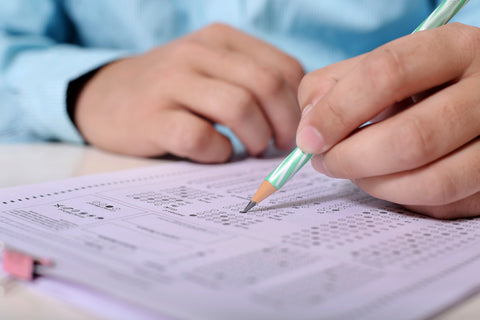Few words are scarier than test, exam, or—maybe the worst ever—pop quiz. Even the most confident student gets butterflies when faced with bubble sheets, blue books, and ‘show your work.’ In high school, tests like the SAT and ACT are a vital part of the graduation process but with a little help, they’re no scarier than walking across the stage in front of family and friends to receive your diploma.
The College Board reports that “Over 2.2 million students in the class of 2019 took the current SAT, up 4% from the class of 2018.” Combine that with the 1.8 million who took the ACT in 2019 and that’s a lot of number 2 pencils in action.
Which test you choose is up to you although the College Board explains that “Schools on the coasts were generally understood to gravitate toward the SAT, while those in the Midwest preferred the ACT. Over time, however, the college application landscape has changed. Schools have grown increasingly flexible, and both tests have now become widely accepted across all U.S. colleges…When it comes down to final decisions, the SAT or ACT question doesn’t have to keep you up at night. Understand the basics for each test, understand your own strengths and weaknesses as a test taker, and let the prep work begin!”
Preparing for the SAT and ACT

One of the best ways to prepare is by familiarizing yourself with sample test questions. This allows you to learn the test’s unique language, so to speak, and fully glean what it is they’re asking for. Using a test question bank like EXAMgen allows teachers to help their students to explore required topics and standards while becoming comfortable with real-life SAT and ACT wording.
Once you’re fluent in figuring out what the questions are asking, there are small ways to reduce anxiety on test day. For example, both the SAT and ACT don’t penalize you for wrong answers. If you’re totally stumped, use the process of elimination to make your best-educated guess. Leaving a question blank does more harm than coming up with an answer. Says Education Corner, “If you don't have any idea what the answer is, then guess. You're aren't penalized for guessing. However, before guessing, always try and eliminate at least one incorrect answer choice.”
They also suggest answering all the easy questions first before returning to focus valuable time and attention on the harder ones. But make sure to budget your time well and “Read each question carefully. Never assume you know what a question is asking until you've read it in its entirety. Sometimes students will provide an answer they recall from a similar question from a practice test. Read the words to each question carefully.”
But the one thing every tutor, teacher, and test prep service will recommend is practice, practice, practice. Not only will that reinforce the information you’ve learned over the past four years of high school, but it’ll also make test-taking infinitely less scary. As they say, the difference between ‘try’ and ‘triumph’ is just a little ‘umph.’

